重点What learned in Lesson 2 Merrakech
八年级英语上unit2第二课时
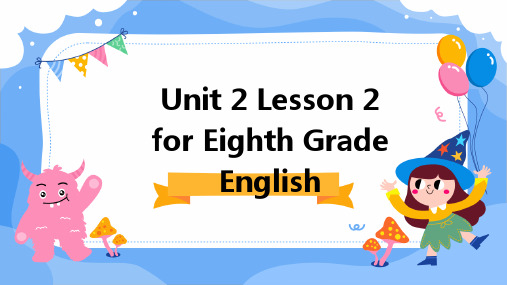
2. They will gain a deeper application for the arts and
culture of the period
3. Students will learn to apply different viewpoints and respect the opinions of others
04
4. They will learn to collaborate and work effectively in a group
setting
Emotional goals
1. Students will develop a sense of maturity about the Renaissance and its impact
Advantages
Collaborative learning can cultivate students' teamwork spirit and communication skills, while promoting mutual learning and growth.
04
Teaching process
Import process
01 02
Introduction of Topic
Begin by introducing the topic of the lesson, which could be through a story, a real life scenario, or a question and answer session to engage students
Definition
Unit2MakeadifferenceUnderstandingideas知识点课件高中英语
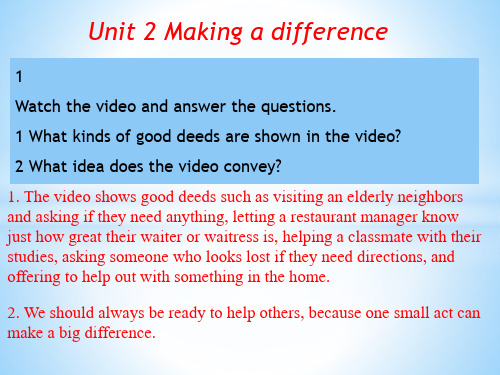
2. set up a foundation 成立一个基金会 3. encourage sb to do sth 鼓励某人做某事 4. attract support from 吸引来自……的支持 5. go on 继续 6. benefit from 得益于,因……而得到好处
2. We should always be ready to help others, because one small act can make a big difference.
视频:Always Ready to Help
2 Look at the pictures of the three people and read the quotations(语录). Talk about the following points: • the contribution these people made to society • the qualities you admire in each of them • other people who have similar qualities
1. The video shows good deeds such as visiting an elderly neighbors and asking if they need anything, letting a restaurant manager know just how great their waiter or waitress is, helping a classmate with their studies, asking someone who looks lost if they need directions, and offering to help out with something in the home.
英语2 Unit2 Learning from Helen Keller

F __ 1) Helen likes the ship in a heavy fog. F __ 2) Miss Sullivan spelled “d-o-l-l” into Helen’s hand T and Helen suddenly understood. __3) At first, Helen just imitated the spelling of T words without understanding them. T __ 4) Helen realized that everything has a name after her teacher had been with her for several weeks.
Can you give examples to show?
That living word awakened my soul, gave it light, hope, joy, and set it free! 这个鲜活的单词唤醒了我的灵魂,……
living 生动的;充满生机、兴趣或活力的 Our history teacher wants to make history a living subject. 我们的历史老师想使历史成为生动有趣的科目。
Based on the pictures and the words, can you predict the content of the passage?
沉默的
… and had no way of knowing where the harbor was. ……找不到港湾
have no way of doing 表示“做谋事是不可能的”
Helen was like a ship in a heavy fog.
第一部分 必修二 Unit 2 Learning from Helen Keller
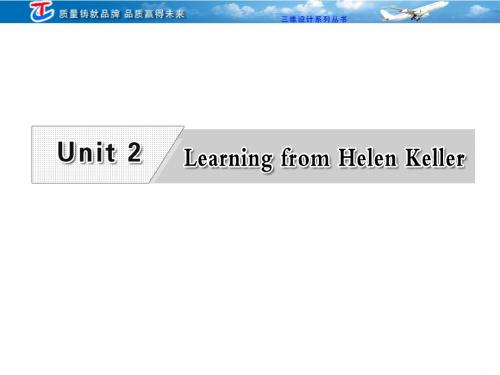
Ⅱ.重点短语必背 1. succeed in 2. a great many 3. set ... free 4. give birth to 在……中获得成功 很多;许多 释放;使……变得自由 孕育;产仔;引起,产生……
5. long for
6. be made up of
渴望;向往
由……构成/组成
14. apart from
15. look up
除了……
查找;检查
Ⅲ.经典句型必会 1.The most important day in all my life was the one on which my teacher, Anne Mansfield Sullivan, came to me.
(desire) to watch his next movie.
答案:desired
Ⅱ.单项填空
1.—Why not join us in playing football?
—I'm afraid not, for I have something important to ________. A.turn to C.look on B.attend to D.take on
2.Her words puzzled me very much because I did not understand anything at that time unless I touched it.
我很困惑,那个时候除能触摸到的东西,我不太能理解其
它的。 解读:unless引导条件状语从句 仿写:要是没有充分准备的话,户外运动有时会意味着受 伤。
解析:考查动词短语辨析。turn to “转向”; attend to “处理”; look on “看待”; take on “呈现;雇用”。由 题意可知B项正确。 答案:B
高中英语必修2必背课文(人教版)
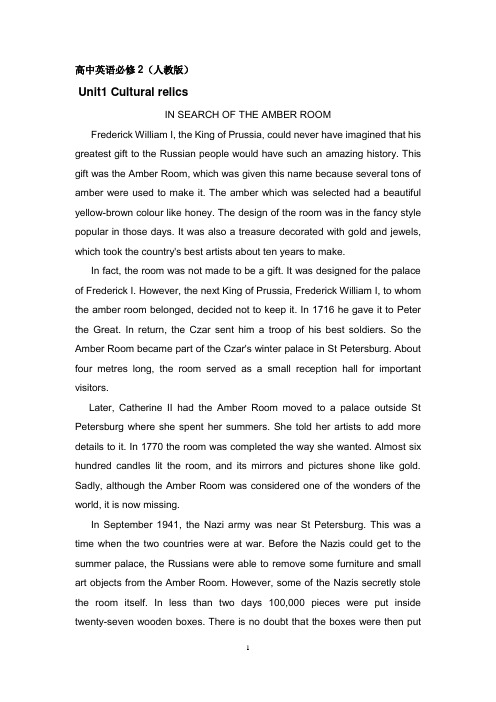
高中英语必修2(人教版)Unit1 Cultural relicsIN SEARCH OF THE AMBER ROOMFrederick William I, the King of Prussia, could never have imagined that his greatest gift to the Russian people would have such an amazing history. This gift was the Amber Room, which was given this name because several tons of amber were used to make it. The amber which was selected had a beautiful yellow-brown colour like honey. The design of the room was in the fancy style popular in those days. It was also a treasure decorated with gold and jewels, which took the country's best artists about ten years to make.In fact, the room was not made to be a gift. It was designed for the palace of Frederick I. However, the next King of Prussia, Frederick William I, to whom the amber room belonged, decided not to keep it. In 1716 he gave it to Peter the Great. In return, the Czar sent him a troop of his best soldiers. So the Amber Room became part of the Czar's winter palace in St Petersburg. About four metres long, the room served as a small reception hall for important visitors.Later, Catherine II had the Amber Room moved to a palace outside St Petersburg where she spent her summers. She told her artists to add more details to it. In 1770 the room was completed the way she wanted. Almost six hundred candles lit the room, and its mirrors and pictures shone like gold. Sadly, although the Amber Room was considered one of the wonders of the world, it is now missing.In September 1941, the Nazi army was near St Petersburg. This was a time when the two countries were at war. Before the Nazis could get to the summer palace, the Russians were able to remove some furniture and small art objects from the Amber Room. However, some of the Nazis secretly stole the room itself. In less than two days 100,000 pieces were put inside twenty-seven wooden boxes. There is no doubt that the boxes were then puton a train for Konigsberg, which was at that time a German city on the Baltic Sea. After that, what happened to the Amber Room remains a mystery.Recently, the Russians and Germans have built a new Amber Room at the summer palace. By studying old photos of the former Amber Room, they have made the new one look like the old one. In 2003 it was ready for the people of St Petersburg when they celebrated the 300th birthday of their city.Unit 2 The Olympic GamesAN INTERVIEWPausanias, who was a Greek writer about 2,000 years ago, has come on a magical journey on March 18th 2007 to find out about the present-day Olympic Games. He is now interviewing Li Yan, a volunteer for the 2008 Olympic Games.P: My name is Pausanias. I lived in what you call “Ancient Greece” and I used to write about the Olympic Games a long time ago. I’ve come to your time to find out about the present-day Olympic Games because I know that in 2004 they were held in my homeland. May I ask you some questions about the modern Olympics?L: Good heavens! Have you really come from so long ago? But of course you can ask any questions you like. What would you like to know?P: How often do you hold your Games?L: Every four years. There are two main sets of Games-the Winter and Summer Olympics, and both are held every four years on a regular basis. The Winter Olympics are usually held two years before the Summer Games. Only athletes who have reached the agreed standard for their event will be admitted as competitors. They may come from anywhere in the world.P: Winter Games? How can the runners enjoy competing in winter? And what about the horses?L: Oh no! There are no running races or horse riding events. Instead there are competitions like skiing and ice skating which need snow and ice. That’s whythey’re called the Winter Olympics. It’s in the Summer Olympics that you have the running races, together with swimming, sailing and all the team sports. P: I see. Earlier you said that athletes are invited from all over the world. Do you mean the Greek world? Our Greek cities used to compete against each other just for the honour of winning. No other countries could join in, nor could slaves or women!L: Nowadays any country can take part if their athletes are good enough. There are over 250 sports and each on has its own standard. Women are not only allowed, but play a very important role in gymnastics, athletics, team sports and …P: Please wait a minute! All those events, all those countries and even women taking part! Where are all the athletes housed?L: For each Olympics, a special village is built for them to live in, a main reception building, several stadiums for competitions, and a gymnasium as well.P: That sounds very expensive. Does anyone want to host the Olympic Games?L: As a matter of fact, every country wants the opportunity. It’s a great responsibility but also a great honour to be chosen. There’s as much competition among countries to host the Olympics as to win Olympic medals. The 2008 Olympics will be held in Beijing, China. Did you know that?P: Oh yes! You must be very proud.L: Certainly. And after that the 2012 Olympics will be held in London. They have already started planning for it. A new village for the athletes and all the stadiums will be built to the east of London. New medals will be designed of course and …P: Did you say medals? So even the olive wreath has been replaced! Oh dear! Do you compete for prize money too?L: No, we don’t. it’s still all about being able to run faster, jump higher and throw further. That’s the motto of the Olympics, you know-“Swifter, Higher and Stronger.”P: Well, that’s good news. How interesting! Thank you so much for your time.Unit 3 ComputersWHO AM I?Over time I have been changed quite a lot. I began as a calculating machine in France in 1642. Although I was young I could simplify difficult sums.I developed very slowly and it took nearly two hundred years before I was built as an analytical machine by Charles Babbage. After I was programmed by an operator who used cards with holes, I could "think" logically and produce an answer quicker than any person. At that time it was considered a technological revolution and the start of my "artificial intelligence". In 1936 my real father, Alan Turing, wrote a book about how I could be made to work as a "universal machine" to solve any difficult mathematical problem. From then on, I grew rapidly both in size and in brainpower. By the 1940s I had grown as large as a room, and I wondered if I would grow any larger. However, this reality also worried my designers. As time went by, I was made smaller. First as a PC (personal computer) and then as a laptop, I have been used in offices and homes since the 1970s.These changes only became possible as my memory improved. First it was stored in tubes, then on transistors and later on very small chips. As a result I totally changed my shape. As I have grown older I have also grown smaller. Over time my memory has developed so much that, like an elephant, I never forget anything I have been told! And my memory became so large that even I couldn't believe it! But I was always so lonely standing there by myself, until in the early 1960s they gave me a family connected by a network. I was able to share my knowledge with others through the World Wide Web.Since the 1970s many new applications have been found for me. I have become very important in communication, finance and trade. I have also been put into robots and used to make mobile phones as well as help with medical operations. I have even been put into space rockets and sent to explore the Moon and Mars. Anyhow, my goal is to provide humans with a life of highquality. I am now truly filled with happiness that I am a devoted friend and helper of the human race!Unit 4 Wildlife protectionHOW DAISY LEARNED TO HELP WLDLIFE Daisy had always longed to help endangered species of wildlife. One day she woke up and found a flying carpet by her bed. "Where do you want to go?" it asked. Daisy responded immediately. "I'd like to see some endangered wildlife," she said. "Please take me to a distant land where I can find the animal that gave fur to make this sweater." At once the carpet flew away and took her to Tibet. There Daisy saw an antelope looking sad. It said, "We're being killed for the wool beneath our stomachs. Our fur is being used to make sweaters for people like you. As a result, we are now an endangered species." At that Daisy cried, "I'm sorry I didn't know that. I wonder what is being done to help you. Flying carpet, please show me a place where there's some wildlife protection."The flying carpet travelled so fast that next minute they were in Zimbabwe. Daisy turned around and found that she was being watched by an elephant. "Have you come to take my photo?" it asked. In relief Daisy burst into laughter. "Don't laugh,” said the elephant, "We used to be an endangered species. Farmers hunted us without mercy. They said we destroyed their farms, and money from tourists only went to the large tour companies. So the government decided to help. They allowed tourists to hunt only a certain number of animals if they paid the farmers. Now the farmers are happy and our numbers are increasing. So good things are being done here to save local wildlife."Daisy smiled. "That's good news. It shows the importance of wildlife protection, but I'd like to help as the WWF suggests." The carpet rose again and almost at once they were in a thick rainforest. A monkey watched them as it rubbed itself. "What are you doing?" asked Daisy. ” I’m protecting myself from mosquitoes," it replied. "When I find a millipede insect, I rub it over my body. It contains a powerful drug which affects mosquitoes. You should paymore attention to the rainforest where I live and appreciate how the animals live together. No rainforest, no animals, no drugs."Daisy was amazed. "Flying carpet, please take me home so I can tell WWF and we can begin producing this new drug. Monkey, please come and help." The monkey agreed. The carpet flew home. As they landed, things began to disappear. Two minutes later everything had gone - the monkey, too. So Daisy was not able to make her new drug. But what an experience! She had learned so much! And there was always WWF…Unit 5 MusicTHE BAND THAT WASN'THave you ever wanted to be part of a band as a famous singer or musician? Have you ever dreamed of playing in front of thousands of people at a concert, at which everyone is clapping and appreciating your music? Do you sing karaoke and pretend you are a famous singer like Song Zuying or Liu Huan? To be honest, a lot of people attach great importance to becoming rich and famous. But just how do people form a band?Many musicians meet and form a band because they like to write and play their own music. They may start as a group of high-school students, for whom practicing their music in someone's house is the first step to fame. Sometimes they may play to passers-by in the street or subway so that they can earn some extra money for themselves or to pay for their instruments. Later they may give performances in pubs or clubs, for which they are paid in cash. Of course they hope to make records in a studio and sell millions of copies to become millionaires!However, there was one band that started in a different way. It was called the Monkees and began as a TV show. The musicians were to play jokes on each other as well as play music, most of which was based loosely on the Beatles. The TV organizers had planned to find four musicians who could act as well as sing. They put an advertisement in a newspaper looking for rockmusicians, but they could only find one who was good enough. They had to use actors for the other three members of the band.As some of these actors could not sing well enough, they had to rely on other musicians to help them. So during the broadcasts they just pretended to sing. Anyhow their performances were humorous enough to be copied by other groups. They were so popular that their fans formed clubs in order to get more familiar with them. Each week on TV, the Monkees would play and sing songs written by other musicians. However, after a year or so in which they became more serious about their work, the Monkees started to play and sing their own songs like a real band. Then they produced their own records and started touring and playing their own music. In the USA they became even more popular than the Beatles and sold even more records. The band broke up about 1970, but happily they reunited in the mid-1980s. They produced a new record in 1996, with which they celebrated their former time as a real band.。
仁爱版八年级英语unit2知识点总结
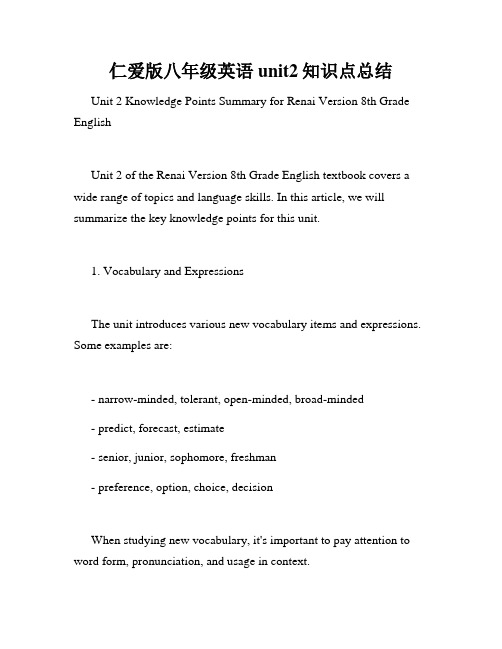
仁爱版八年级英语unit2知识点总结Unit 2 Knowledge Points Summary for Renai Version 8th Grade EnglishUnit 2 of the Renai Version 8th Grade English textbook covers a wide range of topics and language skills. In this article, we will summarize the key knowledge points for this unit.1. Vocabulary and ExpressionsThe unit introduces various new vocabulary items and expressions. Some examples are:- narrow-minded, tolerant, open-minded, broad-minded- predict, forecast, estimate- senior, junior, sophomore, freshman- preference, option, choice, decisionWhen studying new vocabulary, it's important to pay attention to word form, pronunciation, and usage in context.2. Grammar and Sentence StructuresUnit 2 focuses on several important grammatical and structural points, including:- Using comparative and superlative adjectives to make comparisons, e.g. "She is taller than her sister. Her sister is the shortest in the class."- Using the present continuous tense to talk about ongoing actions, e.g. "She is listening to music right now."- Using modal verbs to express ability, possibility, and permission, e.g. "I can speak French. You may borrow my book."It's important to practice using different sentence structures to become more proficient in English.3. Reading and Writing SkillsUnit 2 provides opportunities for students to practice reading and writing skills, such as:- Reading different types of texts, such as biographies, newspaper articles, and opinion pieces- Identifying main ideas, supporting details, and inferences in a text- Writing coherent paragraphs with a topic sentence, supporting sentences, and a concluding sentence- Using transition words and phrases to connect ideas within a paragraph or between paragraphsTo improve reading and writing skills, it's important to develop good reading habits and practice writing regularly.4. Listening and Speaking SkillsUnit 2 includes various listening and speaking activities to help students practice communication skills, such as:- Listening for specific information, such as dates, names, or locations- Participating in group discussions or debates on a topic- Using appropriate tone, vocabulary, and body language in different contexts- Giving presentations or speeches on a topic of interestTo improve listening and speaking skills, it's important to practice regularly with different types of audio and video materials, and to seek feedback from teachers, peers, or language partners.5. Cultural AwarenessFinally, Unit 2 also includes some cultural awareness activities to help students understand and appreciate different cultures and lifestyles. Some examples are:- Researching and presenting on a famous person from a different country or culture- Discussing different attitudes towards education, family, or social issues- Comparing and contrasting different holiday traditions or customs around the worldLearning about different cultures can broaden our perspectives and help us become more empathetic and understanding individuals.Overall, Unit 2 of the Renai Version 8th Grade English textbook offers a comprehensive and engaging learning experience for students, covering different language skills, cultural topics, and real-world applications. By mastering the knowledge points summarized in this article, students can become more confident and competent English learners.。
必修二每章知识点总结英语

必修二每章知识点总结英语In this unit, we learn about the topic of "Personality". We learn to describe people's personalities, interests, and abilities. We also learn to use adjectives to describe people's physical appearance.Vocabulary: Words related to personality and appearance, such as friendly, outgoing, shy, intelligent, attractive, etc.Grammar: We learn about adjectives and their comparative and superlative forms. We also learn about the use of "be" and "have" to describe people's characteristics and physical appearance.Skills: We learn to describe people's personalities and physical appearance using adjectives and simple sentences. We also practice speaking and listening to understand descriptions of people's personalities and appearance.Unit 2In this unit, we learn about the topic of "Education". We learn about different types of schools and education systems, and we practice talking about our own educational experiences.Vocabulary: Words related to education, such as school, college, university, teacher, student, class, etc.Grammar: We learn about the use of "there is/there are" to describe the existence of things in a place. We also learn about the use of "some" and "any" to talk about quantity.Skills: We practice speaking and writing about our educational experiences, and we learn to ask and answer questions about schools and education systems.Unit 3In this unit, we learn about the topic of "Communication". We learn about different forms of communication, such as speaking, writing, and non-verbal communication. We also practice using appropriate language for different communication situations.Vocabulary: Words related to communication, such as speak, write, listen, understand, message, email, etc.Grammar: We learn about the use of modal verbs to express possibility, ability, and permission. We also learn about the use of the present simple and present continuous tenses.Skills: We practice speaking and writing in different communication situations, such as giving opinions, making requests, and asking for information.Unit 4In this unit, we learn about the topic of "Travel and Transport". We learn about different modes of transport, and we practice asking for and giving directions.Vocabulary: Words related to travel and transport, such as car, bus, train, plane, bicycle, taxi, etc.Grammar: We learn about the use of prepositions of place and adverbs of direction to describe locations and give directions. We also learn about the use of the present perfect tense to talk about experiences.Skills: We practice asking for and giving directions, and we learn to describe past travel experiences using the present perfect tense.Unit 5In this unit, we learn about the topic of "Health and Fitness". We learn about different health problems, healthy habits, and ways to stay fit.Vocabulary: Words related to health and fitness, such as exercise, diet, healthy, unhealthy, doctor, nurse, etc.Grammar: We learn about the use of the present continuous tense to talk about current actions and situations. We also learn about the use of the imperative form to give advice and instructions.Skills: We practice talking about health and fitness habits, and we learn to give advice and make suggestions for staying healthy and fit.Unit 6In this unit, we learn about the topic of "Food and Drink". We learn about different types of food and drinks, and we practice ordering and describing meals.Vocabulary: Words related to food and drinks, such as breakfast, lunch, dinner, meal, fruit, vegetable, meat, fish, etc.Grammar: We learn about the use of countable and uncountable nouns to talk about food and drinks. We also learn about the use of "can" and "could" to ask for and give permission.Skills: We practice ordering meals in a restaurant, and we learn to describe our food and drink preferences. We also learn to give and follow recipes for cooking different dishes.Unit 7In this unit, we learn about the topic of "Hobbies and Leisure Activities". We learn about different hobbies and leisure activities, and we practice talking about our own interests and preferences.Vocabulary: Words related to hobbies and leisure activities, such as play, read, watch, listen, hobby, interest, etc.Grammar: We learn about the use of the present simple tense to talk about habitual actions. We also learn about the use of "like" and "enjoy" to talk about preferences.Skills: We practice talking about our hobbies and leisure activities, and we learn to ask and answer questions about other people's interests and preferences.Unit 8In this unit, we learn about the topic of "The Natural World". We learn about different aspects of the natural world, such as the environment, animals, and plants.Vocabulary: Words related to the natural world, such as tree, flower, bird, animal, forest, desert, ocean, etc.Grammar: We learn about the use of the present continuous tense to talk about temporary actions and situations. We also learn about the use of "would like" to express desires and preferences.Skills: We practice talking about the natural world, and we learn to discuss environmental issues and ways to protect the environment.Unit 9In this unit, we learn about the topic of "Everyday Life". We learn about different aspects of daily life, such as daily routines, household chores, and personal care.Vocabulary: Words related to everyday life, such as wake up, get dressed, have breakfast, do homework, clean, cook, etc.Grammar: We learn about the use of the present simple tense to talk about daily routines and habits. We also learn about the use of "have to" and "should" to talk about obligations and advice.Skills: We practice talking about our daily routines and personal care habits, and we learn to give and follow instructions for everyday tasks.Unit 10In this unit, we learn about the topic of "The World of Work". We learn about different jobs and professions, and we practice talking about our career aspirations and work experiences. Vocabulary: Words related to jobs and professions, such as doctor, teacher, engineer, accountant, lawyer, etc.Grammar: We learn about the use of the present perfect tense to talk about past experiences. We also learn about the use of "will" and "going to" to talk about future plans and intentions.Skills: We practice talking about our career aspirations and work experiences, and we learn to ask and answer questions about different jobs and professions.。
人教版高中英语必修2Unit 2课文讲解

必修2 Unit 2 An interview
L: Good heavens天哪! Have you really come from so long ago那么久远的 年代? But of course you can ask any questions you like想问的. What would you like to know?
over: more than 多于… Women are not only allowed, but play a very
important role作用 in gymnastics体操, athletics竞技, team sports团队项目 and... Not only …but (also)… 不但…而且 Where are all the athletes housed住?
P: That sounds very expensive要花很多钱. Does anyone会有人 want to host承办
the Olympic Games?
必修2 Unit 2 An interview
a special village is built (一般现在时被动 语态)for them to live in, a main reception building
Be housed 居住
必修2 Unit 2 An interview
IN-CLASS WORK
P15 3 work out the order
把下列句子排序
必修2 Unit 2 An interview P15 3 work out the order
把下列句子排序 ANSWERS
《Lesson 2》 知识清单
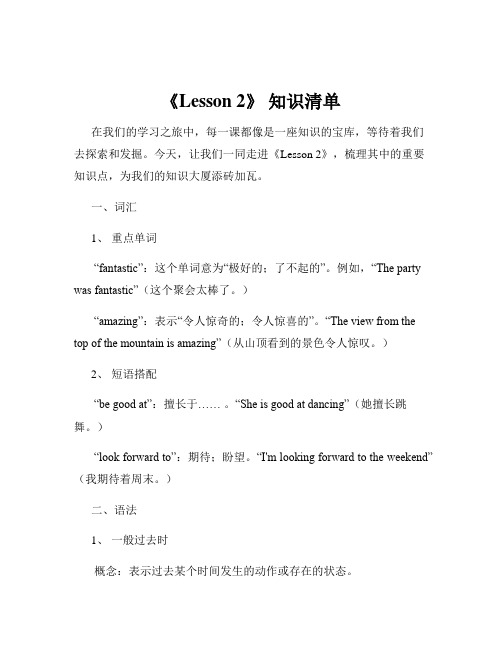
《Lesson 2》知识清单在我们的学习之旅中,每一课都像是一座知识的宝库,等待着我们去探索和发掘。
今天,让我们一同走进《Lesson 2》,梳理其中的重要知识点,为我们的知识大厦添砖加瓦。
一、词汇1、重点单词“fantastic”:这个单词意为“极好的;了不起的”。
例如,“The party was fantastic”(这个聚会太棒了。
)“amazing”:表示“令人惊奇的;令人惊喜的”。
“The view from the top of the mountain is amazing”(从山顶看到的景色令人惊叹。
)2、短语搭配“be good at”:擅长于…… 。
“She is good at dancing”(她擅长跳舞。
)“look forward to”:期待;盼望。
“I'm looking forward to the weekend”(我期待着周末。
)二、语法1、一般过去时概念:表示过去某个时间发生的动作或存在的状态。
构成:主语+动词的过去式+其他。
例如,“I played basketball yesterday”(我昨天打篮球了。
)常用的时间状语:yesterday(昨天)、last week(上周)、two days ago(两天前)等。
2、形容词和副词的比较级和最高级比较级的构成:一般在词尾加 er ,如“tall taller”;以不发音的 e 结尾的单词,直接加 r ,如“nice nicer”;重读闭音节词,双写末尾辅音字母再加 er ,如“big bigger”。
最高级的构成:一般在词尾加 est ,如“tall tallest”;以不发音的 e 结尾的单词,直接加 st ,如“nice nicest”;重读闭音节词,双写末尾辅音字母再加 est ,如“big biggest”;多音节词和部分双音节词,在前面加 more/most ,如“beautiful more beautiful most beautiful”。
人教版英语八年级下册unit 2笔记
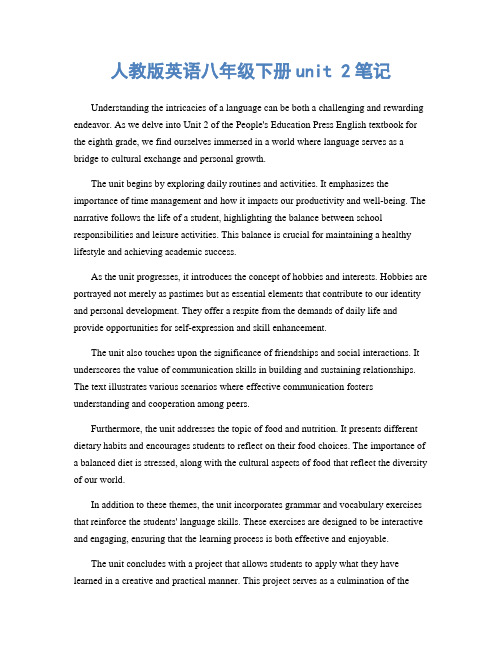
人教版英语八年级下册unit 2笔记Understanding the intricacies of a language can be both a challenging and rewarding endeavor. As we delve into Unit 2 of the People's Education Press English textbook for the eighth grade, we find ourselves immersed in a world where language serves as a bridge to cultural exchange and personal growth.The unit begins by exploring daily routines and activities. It emphasizes the importance of time management and how it impacts our productivity and well-being. The narrative follows the life of a student, highlighting the balance between school responsibilities and leisure activities. This balance is crucial for maintaining a healthy lifestyle and achieving academic success.As the unit progresses, it introduces the concept of hobbies and interests. Hobbies are portrayed not merely as pastimes but as essential elements that contribute to our identity and personal development. They offer a respite from the demands of daily life and provide opportunities for self-expression and skill enhancement.The unit also touches upon the significance of friendships and social interactions. It underscores the value of communication skills in building and sustaining relationships. The text illustrates various scenarios where effective communication fosters understanding and cooperation among peers.Furthermore, the unit addresses the topic of food and nutrition. It presents different dietary habits and encourages students to reflect on their food choices. The importance of a balanced diet is stressed, along with the cultural aspects of food that reflect the diversity of our world.In addition to these themes, the unit incorporates grammar and vocabulary exercises that reinforce the students' language skills. These exercises are designed to be interactive and engaging, ensuring that the learning process is both effective and enjoyable.The unit concludes with a project that allows students to apply what they have learned in a creative and practical manner. This project serves as a culmination of theunit's lessons, enabling students to demonstrate their understanding and proficiency in the English language.In crafting this document, care has been taken to ensure that the language used is precise, vivid, and concise. The content is structured to maintain a logical flow, with each paragraph seamlessly connecting to the next. The tone remains consistent throughout, providing a smooth and coherent reading experience.By adhering to these guidelines, the document aims to encapsulate the essence of Unit 2, offering a comprehensive overview that is both informative and engaging. It is a testament to the power of language as a tool for learning and connection, and it reflects the high standards set forth for educational materials. Through this unit, students are equipped not only with language proficiency but also with the cultural awareness and life skills necessary for their journey ahead. 。
八年级英语第二课知识点
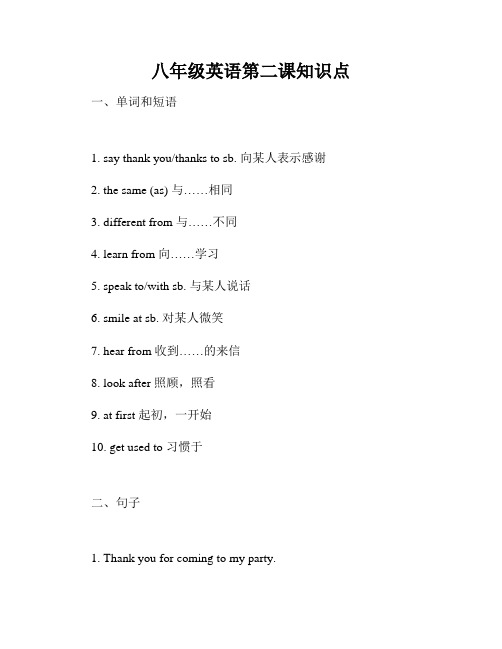
八年级英语第二课知识点一、单词和短语1. say thank you/thanks to sb. 向某人表示感谢2. the same (as) 与……相同3. different from 与……不同4. learn from 向……学习5. speak to/with sb. 与某人说话6. smile at sb. 对某人微笑7. hear from 收到……的来信8. look after 照顾,照看9. at first 起初,一开始10. get used to 习惯于二、句子1. Thank you for coming to my party.感谢你来参加我的聚会。
2. Is your name the same as your brother's?你的名字和你兄弟的一样吗?3. My hobby is different from yours.我的爱好与你的不同。
4. We can learn a lot from our teachers.我们可以从老师那里学到很多东西。
5. I want to speak to/with you about something important.我想和你谈谈一些重要的事情。
6. She smiled at me when we met.我们相遇时她对我微笑了。
7. I haven't heard from my friend for a long time.我很久没有收到我的朋友来信了。
8. Can you look after my cat while I'm away?我离开期间你能照看我的猫吗?9. At first, I didn't like this place, but now I do.起初,我不喜欢这个地方,但现在我却喜欢了。
10. I need some time to get used to the new environment.我需要一些时间适应新的环境。
《Lesson 2》 知识清单
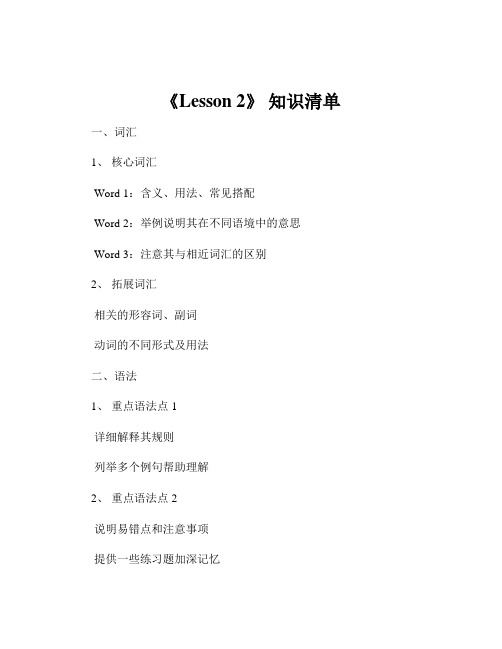
《Lesson 2》知识清单一、词汇1、核心词汇Word 1:含义、用法、常见搭配Word 2:举例说明其在不同语境中的意思Word 3:注意其与相近词汇的区别2、拓展词汇相关的形容词、副词动词的不同形式及用法二、语法1、重点语法点 1详细解释其规则列举多个例句帮助理解2、重点语法点 2说明易错点和注意事项提供一些练习题加深记忆3、特殊语法现象介绍其独特之处对比与常规语法的不同三、句型1、常用句型 1分析结构和用法给出模仿造句的示例2、常用句型 2强调使用场景展示实际运用的例子四、阅读理解1、阅读技巧如何快速抓住文章主旨怎样理解关键语句2、阅读练习提供一篇短文进行阅读分析提出相关问题检验理解五、写作1、写作主题给出几个常见的写作话题2、写作要点阐述如何构思文章结构强调语言表达的准确性和流畅性3、范文示例展示一篇优秀范文并进行点评六、听力1、听力技巧培养捕捉关键信息的能力熟悉不同口音和语速2、听力练习提供一段听力材料进行练习附上听力原文和答案七、口语1、发音要点纠正常见的发音错误介绍发音规则2、口语表达常用的口语短语和句子进行情景模拟练习在学习 Lesson 2 的过程中,要注重对各个知识点的理解和运用。
多做练习,多积累,不断巩固所学知识。
同时,要将所学知识运用到实际的语言交流中,提高语言综合运用能力。
对于词汇部分,不仅要记住单词的拼写和意思,更要了解其在不同语境中的用法。
通过阅读、写作等方式加深对词汇的理解和记忆。
语法是构建语言的规则,要熟练掌握重点语法点,理解其逻辑和规律。
在练习中不断强化,避免语法错误。
句型的学习有助于提高语言表达的丰富性和准确性。
多模仿、多练习,逐渐形成自己的语言风格。
阅读理解需要培养阅读习惯和技巧,提高阅读速度和理解能力。
写作要注重思路清晰、结构合理、语言规范。
多读范文,学习优秀的写作方法。
听力和口语的提升需要不断地练习和模仿,勇敢开口说,多听多练,逐步提高听说能力。
希望这份知识清单能够帮助您更好地掌握 Lesson 2 的内容,祝您学习顺利!。
英语选修2课文知识点总结
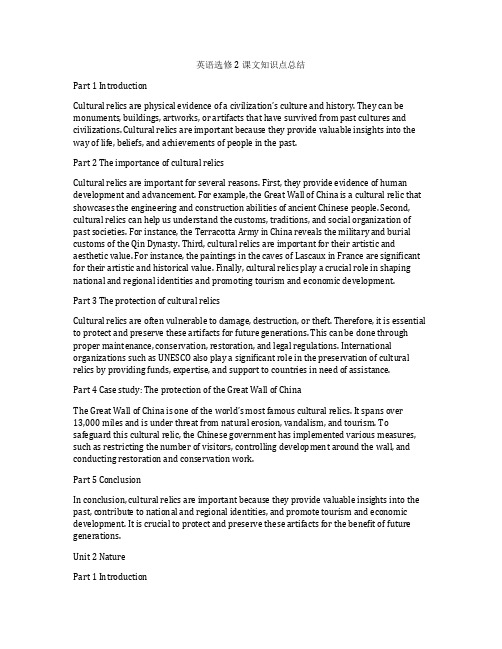
英语选修2课文知识点总结Part 1 IntroductionCultural relics are physical evidence of a civilization’s culture and history. They can be monuments, buildings, artworks, or artifacts that have survived from past cultures and civilizations. Cultural relics are important because they provide valuable insights into the way of life, beliefs, and achievements of people in the past.Part 2 The importance of cultural relicsCultural relics are important for several reasons. First, they provide evidence of human development and advancement. For example, the Great Wall of China is a cultural relic that showcases the engineering and construction abilities of ancient Chinese people. Second, cultural relics can help us understand the customs, traditions, and social organization of past societies. For instance, the Terracotta Army in China reveals the military and burial customs of the Qin Dynasty. Third, cultural relics are important for their artistic and aesthetic value. For instance, the paintings in the caves of Lascaux in France are significant for their artistic and historical value. Finally, cultural relics play a crucial role in shaping national and regional identities and promoting tourism and economic development.Part 3 The protection of cultural relicsCultural relics are often vulnerable to damage, destruction, or theft. Therefore, it is essential to protect and preserve these artifacts for future generations. This can be done through proper maintenance, conservation, restoration, and legal regulations. International organizations such as UNESCO also play a significant role in the preservation of cultural relics by providing funds, expertise, and support to countries in need of assistance.Part 4 Case study: The protection of the Great Wall of ChinaThe Great Wall of China is one of the world’s most famous cultural relics. It spans over 13,000 miles and is under threat from natural erosion, vandalism, and tourism. To safeguard this cultural relic, the Chinese government has implemented various measures, such as restricting the number of visitors, controlling development around the wall, and conducting restoration and conservation work.Part 5 ConclusionIn conclusion, cultural relics are important because they provide valuable insights into the past, contribute to national and regional identities, and promote tourism and economic development. It is crucial to protect and preserve these artifacts for the benefit of future generations.Unit 2 NaturePart 1 IntroductionNature encompasses the physical world and all living organisms. It includes plants, animals, landscapes, and natural phenomena such as weather, climate, and geological processes. Nature is essential for human survival and well-being and provides a source of inspiration, beauty, and recreation.Part 2 The importance of natureNature plays a vital role in maintaining the ecological balance and supporting life on Earth. For example, plants produce oxygen, regulate the climate, and provide habitats for wildlife. Moreover, nature provides essential resources such as food, water, and medicine, and contributes to leisure and recreational activities.Part 3 The impact of human activities on natureHuman activities such as deforestation, pollution, and climate change have had a detrimental impact on nature. These activities have led to the loss of biodiversity, habitat destruction, and environmental degradation, which in turn have negative consequences for human health and well-being.Part 4 Case study: The impact of deforestation on the Amazon rainforestThe Amazon rainforest, located in South America, is one of the most biodiverse and ecologically significant regions in the world. However, due to deforestation for logging, agriculture, and mining, the Amazon rainforest is facing severe threats. As a result, there has been a decline in biodiversity, loss of carbon storage, and disruption of local and global climate patterns.Part 5 Conservation and preservation of natureIt is essential to take measures to conserve and preserve nature for the benefit of current and future generations. This can be achieved through the establishment of protected areas, sustainable resource management, reforestation, and environmental education and advocacy. International cooperation and agreements are also crucial for the conservation of nature on a global scale.Part 6 ConclusionIn conclusion, nature is essential for human survival, well-being, and quality of life. It is crucial to protect and preserve nature and take measures to mitigate the impact of human activities on the environment. By doing so, we can ensure the continued availability of natural resources and the maintenance of ecological balance and biodiversity.。
三年级下册第二课英语
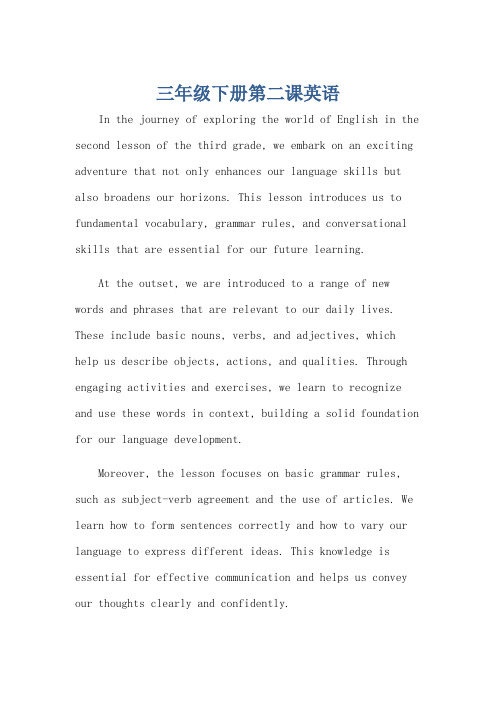
三年级下册第二课英语In the journey of exploring the world of English in the second lesson of the third grade, we embark on an exciting adventure that not only enhances our language skills but also broadens our horizons. This lesson introduces us to fundamental vocabulary, grammar rules, and conversational skills that are essential for our future learning.At the outset, we are introduced to a range of new words and phrases that are relevant to our daily lives. These include basic nouns, verbs, and adjectives, which help us describe objects, actions, and qualities. Through engaging activities and exercises, we learn to recognize and use these words in context, building a solid foundation for our language development.Moreover, the lesson focuses on basic grammar rules, such as subject-verb agreement and the use of articles. We learn how to form sentences correctly and how to vary our language to express different ideas. This knowledge is essential for effective communication and helps us convey our thoughts clearly and confidently.In addition to vocabulary and grammar, the lesson also emphasizes conversational skills. Through role-play and group discussions, we practice using the new language in practical situations. This not only improves our fluency but also enhances our ability to understand and respond to different contexts.Furthermore, the lesson incorporates cultural elements, introducing us to the English-speaking world. We learn about customs, traditions, and ways of life in English-speaking countries, which broadens our understanding of global diversity. This knowledge not only enriches our learning experience but also prepares us for future interactions with people from different cultures.The teaching methods employed in this lesson are innovative and engaging. Our teachers use a variety of techniques, including visual aids, songs, and games, to make learning fun and interactive. This approach keeps us engaged and motivated, ensuring that we retain the information and skills we learn.Moreover, the lesson encourages us to be active learners. We are given opportunities to explore thelanguage independently, through reading, writing, and speaking activities. This fosters our creativity and critical thinking skills, enabling us to apply the knowledge we have learned to new situations.In conclusion, the second lesson of the third grade English curriculum is a comprehensive and engaging introduction to the world of English. It equips us with fundamental vocabulary, grammar rules, and conversational skills that are crucial for our language development. Through innovative teaching methods and active learning opportunities, we embark on a journey of discovery that prepares us for further exploration in the exciting realm of English.**三年级下册第二课英语的学习之旅**在三年级下册第二课英语的探索之旅中,我们踏上了一段激动人心的冒险之旅,这不仅能提升我们的语言技能,还能拓宽我们的视野。
英语第二课的知识点总结
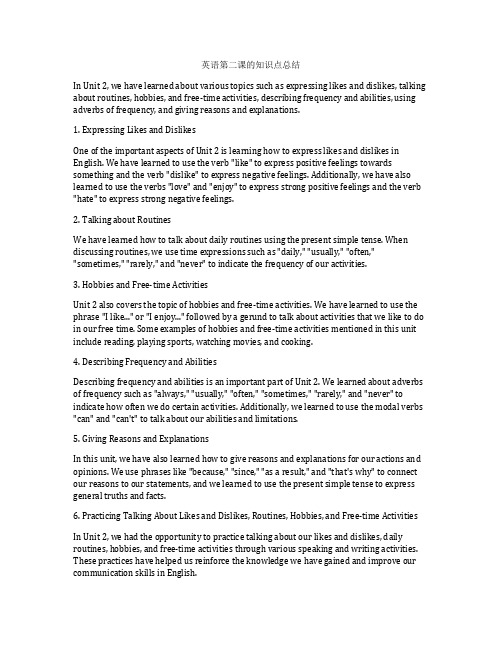
英语第二课的知识点总结In Unit 2, we have learned about various topics such as expressing likes and dislikes, talking about routines, hobbies, and free-time activities, describing frequency and abilities, using adverbs of frequency, and giving reasons and explanations.1. Expressing Likes and DislikesOne of the important aspects of Unit 2 is learning how to express likes and dislikes in English. We have learned to use the verb "like" to express positive feelings towards something and the verb "dislike" to express negative feelings. Additionally, we have also learned to use the verbs "love" and "enjoy" to express strong positive feelings and the verb "hate" to express strong negative feelings.2. Talking about RoutinesWe have learned how to talk about daily routines using the present simple tense. When discussing routines, we use time expressions such as "daily," "usually," "often," "sometimes," "rarely," and "never" to indicate the frequency of our activities.3. Hobbies and Free-time ActivitiesUnit 2 also covers the topic of hobbies and free-time activities. We have learned to use the phrase "I like..." or "I enjoy..." followed by a gerund to talk about activities that we like to do in our free time. Some examples of hobbies and free-time activities mentioned in this unit include reading, playing sports, watching movies, and cooking.4. Describing Frequency and AbilitiesDescribing frequency and abilities is an important part of Unit 2. We learned about adverbs of frequency such as "always," "usually," "often," "sometimes," "rarely," and "never" to indicate how often we do certain activities. Additionally, we learned to use the modal verbs "can" and "can't" to talk about our abilities and limitations.5. Giving Reasons and ExplanationsIn this unit, we have also learned how to give reasons and explanations for our actions and opinions. We use phrases like "because," "since," "as a result," and "that's why" to connect our reasons to our statements, and we learned to use the present simple tense to express general truths and facts.6. Practicing Talking About Likes and Dislikes, Routines, Hobbies, and Free-time Activities In Unit 2, we had the opportunity to practice talking about our likes and dislikes, daily routines, hobbies, and free-time activities through various speaking and writing activities. These practices have helped us reinforce the knowledge we have gained and improve our communication skills in English.7. Reviewing and Applying Vocabulary and GrammarThroughout Unit 2, we reviewed and applied vocabulary related to likes and dislikes, routines, hobbies, and free-time activities. We also applied grammar concepts such as the present simple tense, adverbs of frequency, modal verbs, and reasons and explanations in our speaking and writing tasks.8. Summary of Unit 2Overall, Unit 2 has provided us with valuable knowledge and skills related to expressing likes and dislikes, talking about routines, hobbies, and free-time activities, describing frequency and abilities, and giving reasons and explanations. Through this unit, we have improved our English communication abilities and expanded our vocabulary and grammar knowledge. This knowledge and skills will be valuable as we continue to progress in our English language learning journey.。
必修1 Module2 My New Teachers重要知识点

Unit 2. My New Teachers一.重点词汇及拓展1.avoid vt.(故意)避开2.amusing adj.有趣的;可笑的→amused adj.感到有趣的→amusement n.娱乐,乐趣→amuse v.使愉快3.energetic adj.精力充沛的→energy n.精力4.intelligent adj.聪明的→intelligence n.智5.organised adj.有组织的;有系统的→organise v.组织→organisation n.组织;团体6.patient adj.耐心的→patience n.耐心7.hate vt.讨厌;不喜欢→hatred n.仇恨,敌意8.appreciate vt.感激→appreciation n.感激9.admit vt.承认;许可;进入→admission n.许可10.scientific adj.科学的→science n.科学→scientist n.科学家11.summary n.总结;摘要→summarize v.概述12.relationship n.关系→relation n.关系→relative adj.&n.比较的,相对的;亲戚→related adj.有关的,相联系的→relate v.有关,涉及13.relaxed adj.轻松的;松懈的;宽松的→relax v.(使)轻松→relaxation n.轻松,放松14.similarly adv.同样地;类似地→similar adj.相似的→similarity n.类似二.重点短语1. make sure确定;确信;查明2.make mistakes犯错误3.make progress取得进步4.play jokes讲笑话;开玩笑5.as a result作为结果,因此6. be strict with对……要求严格7.in fact事实上8.fall asleep睡着9.be true of 对……适用,符合10.would rather宁愿三.语法Verbs followed by ing (接动名词作宾语的动词)四.重点句型...and she explains English grammar so clearly that even I can understand it!……她讲解英语语法如此清楚,甚至连我都能明白。
Unit 2 重要知识点讲解2021-2022学年人教版高中英语必修二
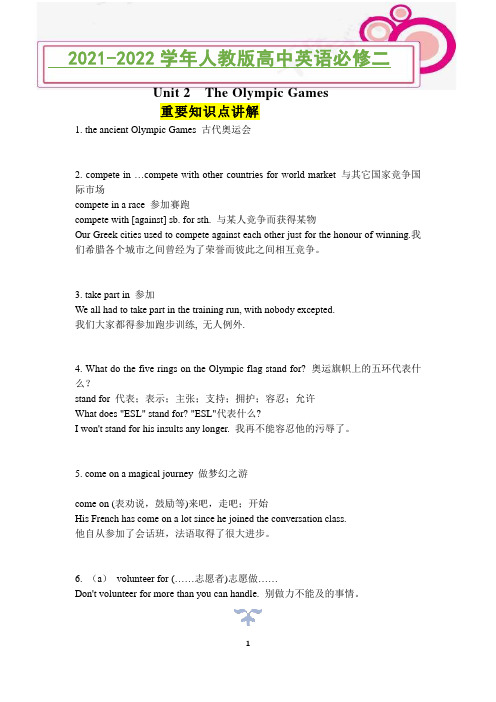
Unit 2The Olympic Games重要知识点讲解1. the ancient Olympic Games 古代奥运会2. compete in …compete with other countries for world market 与其它国家竞争国际市场compete in a race 参加赛跑compete with [against] sb. for sth. 与某人竞争而获得某物Our Greek cities used to compete against each other just for the honour of winning.我们希腊各个城市之间曾经为了荣誉而彼此之间相互竞争。
3. take part in 参加We all had to take part in the training run, with nobody excepted.我们大家都得参加跑步训练, 无人例外.4. What do the five rings on the Olympic flag stand for? 奥运旗帜上的五环代表什么?stand for 代表;表示;主张;支持;拥护;容忍;允许What does "ESL" stand for? "ESL"代表什么?I won't stand for his insults any longer. 我再不能容忍他的污辱了。
5. come on a magical journey 做梦幻之游come on (表劝说,鼓励等)来吧,走吧;开始His French has come on a lot since he joined the conversation class.他自从参加了会话班,法语取得了很大进步。
6. (a)volunteer for (……志愿者)志愿做……Don't volunteer for more than you can handle. 别做力不能及的事情。
英语初一第二课总结知识点
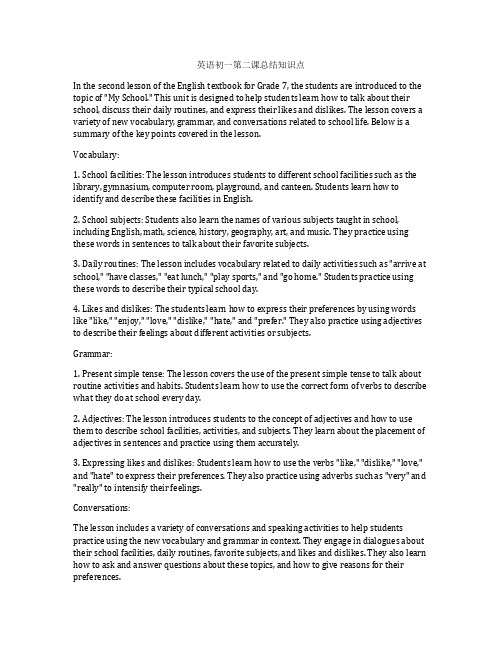
英语初一第二课总结知识点In the second lesson of the English textbook for Grade 7, the students are introduced to the topic of "My School." This unit is designed to help students learn how to talk about their school, discuss their daily routines, and express their likes and dislikes. The lesson covers a variety of new vocabulary, grammar, and conversations related to school life. Below is a summary of the key points covered in the lesson.Vocabulary:1. School facilities: The lesson introduces students to different school facilities such as the library, gymnasium, computer room, playground, and canteen. Students learn how to identify and describe these facilities in English.2. School subjects: Students also learn the names of various subjects taught in school, including English, math, science, history, geography, art, and music. They practice using these words in sentences to talk about their favorite subjects.3. Daily routines: The lesson includes vocabulary related to daily activities such as "arrive at school," "have classes," "eat lunch," "play sports," and "go home." Students practice using these words to describe their typical school day.4. Likes and dislikes: The students learn how to express their preferences by using words like "like," "enjoy," "love," "dislike," "hate," and "prefer." They also practice using adjectives to describe their feelings about different activities or subjects.Grammar:1. Present simple tense: The lesson covers the use of the present simple tense to talk about routine activities and habits. Students learn how to use the correct form of verbs to describe what they do at school every day.2. Adjectives: The lesson introduces students to the concept of adjectives and how to use them to describe school facilities, activities, and subjects. They learn about the placement of adjectives in sentences and practice using them accurately.3. Expressing likes and dislikes: Students learn how to use the verbs "like," "dislike," "love," and "hate" to express their preferences. They also practice using adverbs such as "very" and "really" to intensify their feelings.Conversations:The lesson includes a variety of conversations and speaking activities to help students practice using the new vocabulary and grammar in context. They engage in dialogues about their school facilities, daily routines, favorite subjects, and likes and dislikes. They also learn how to ask and answer questions about these topics, and how to give reasons for their preferences.Cultural knowledge:In addition to language skills, the lesson also provides students with information about school life in English-speaking countries. They learn about the typical school day, extracurricular activities, and school facilities in these countries. This helps students understand the differences and similarities between their own school experiences and those of students in other parts of the world.Overall, the unit on "My School" in the Grade 7 English textbook covers a wide range of vocabulary, grammar, and conversations related to school life. By the end of the lesson, students should be able to talk about their school, describe their daily routines, and express their likes and dislikes in English. They should also have a better understanding of school life in different cultures, which can help them develop a broader perspective on the world.。
